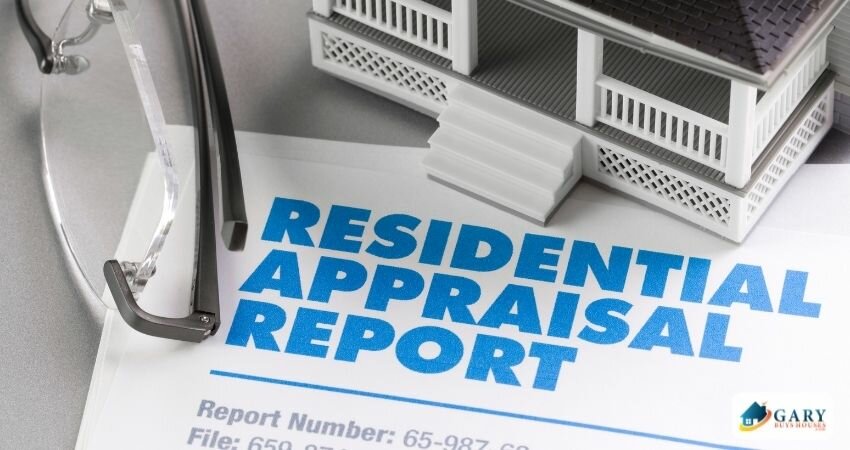Do home appraisers look in closets? How about the garage? It can be nerve wracking to prepare for a home appraisal — knowing that the price they set will largely determine how much you can sell your home for — and you may be wondering just how thorough a home inspection will be. Read more to see what affects home appraisals.
Home Appraisals: What To Expect

An appraisal is completed by an unbiased, certified, professional who uses several different factors to determine your home value. Appraisals are an important part of the home selling process as they help set the asking price for the home and help the bank determine how much loan they will offer to potential buyers. An appraiser will visit your home in person and make a visual inspection of your home inside and out. They are filling out an appraisals report (free template) which includes information like:
- Age of home
- Quality and materials in the roof
- Number of Bed/Bath and stories
- Square footage (if you see them with a tape measure, this is why)
- The quality of the foundation
- Type of neighborhood
- Curb appeal and parking situation (including garage)
- What the home is made of including floor and walls
- The current housing market
- Basement and attic (finished, usable space or not)
With this information they use comparable sales in your area and determine an appraisal price for the home.
Do Appraisers Look in Closets?

So how nosy does an appraiser get? Will they open closet doors? Yes, they probably will — though not to see how tidy you are. An appraiser might need to see how big a closet is and measure the area to include in the floor space. If you have a messy closet space or you are tempted to shove and hide some items in the closet to get it out of the way while the appraiser is visiting then think again and prepare that space so you aren’t embarrassed by what might fall out during an appraisal.
Do Appraisers Look in Garages?
Yes, an appraiser will look in the garage. They need to determine the space (how many cars it can hold) and include it in the official appraisal. While the garage isn’t usually the most show-worthy part of your home just keep in mind that an appraiser will be checking the function of the space — is the concrete cracked, does the garage door work, etc.
Do Appraisers Look in Attics?
An appraisers may your attic under certain circumstances. Attics hold potential value indicators and insights that can influence a property’s appraisal. While not all appraisers include attic inspection as a standard procedure, they may choose to examine it for specific reasons. Here are a few factors that determine whether an appraiser looks in attics:
- Accessibility and Safety: Appraisers prioritize safety and accessibility during property inspections. If the attic is easily accessible and poses no safety hazards, they are more likely to include it in their evaluation. A well-lit and properly ventilated attic with a sturdy ladder or stairs facilitates inspection.
- Signs of Damage or Maintenance: Attic conditions can provide valuable insights into a property’s maintenance history. Appraisers pay attention to signs of water damage, pest infestations like termites, insulation quality, and overall structural integrity. These factors can impact the property’s value and influence the appraiser’s assessment.
- Additional Living Space: In some cases, finished attics or attic conversions may contribute to the overall living space of a property. If the attic has been converted into habitable space and is permitted by local building codes, appraisers may consider it as part of the home’s square footage calculation.
Do Appraisers Look in Cupboards?
Not necessarily. Cupboard space doesn’t equate for much in a home appraisal. If they cupboards are about to fall off the walls then that might lead to further inspection, but otherwise the contents of your cupboards are for your eyes only.
Does a Messy House Affect a Home Appraisal?

While an appraiser isn’t supposed to take in the cleanliness of the home as a factor in the appraisal, it is definitely possible for junk, odor, visible dirt and other messes to unconsciously bias the appraiser and not in a good way. A messy home can be a red flag that the home isn’t well cared for and it could encourage the appraiser to look more closely to see what the mess could be hiding. Do yourself a favor and deep clean the home before an appraiser visits so you don’t negatively affect your home appraisal.
Do Appraisers Look Under Sinks?
Yes, you can expect a home appraisal to check under the sink to make sure there isn’t any water damage, mold issues or problems hiding. Don’t stress about the storage of bags and dish soaps but do make sure the area is clean and accessible.
Do Unfinished Projects Affect Home Appraisals?
Unfinished projects, we’ve all got them, but do they hurt a home appraisal? Well, the answer is, it depends. If you have major renovations that are pending — such as a half finished basement or a missing tub in a bathroom, then yes, that can affect the final appraisal price of your home. Keep in mind that most people aren’t looking to flip a property or move in and be saddled with months of projects, your home will be much more attractive if all the major projects are complete and the return on investment of the project will usually pay off when you sell the home.
Home Appraisal Do’s and Don’ts:

Do deep clean.
Having a home free of clutter and messes will help the appraiser do their job quickly and efficiently. Don’t give them a reason to linger or wonder if water damage is actually what’s hiding behind a pile in the corner. Home appraisers often take photos so prepare your home as if you’ll be showing your home and you’ll have nothing to worry (or be embarrassed) about.
Do finish noticeable projects.
If you have half finished house projects that call attention then take a moment to finish them before the appraisal. Don’t sweat the small stuff that really doesn’t matter like dust on a ceiling fan or a broken couch but do pay attention to the half-painted bedroom or the missing cupboard doors.
Do itemize and list money amounts for any upgrades you’ve done on the home.
There is nothing wrong with making sure the appraiser knows about any upgrades or fixes you’ve done on the home while living there. Give the appraiser an itemized list with the money amounts, there is no guarantee it will positively affect the appraisal but it doesn’t hurt. It’s always good for the appraiser to know if you paid for a top-of-the-line furnace or installed a hot tub that will be staying with the home.
Don’t talk down your house to the appraiser.
If the appraiser asks questions keep your answers simple — if they ask about the roof don’t tell them about the leak you had to fix last year. The appraiser will do their own due diligence to determine the state of the home and any comments you might make could actually give a negative impression of your home. Keep it simple and keep it positive.
Don’t forget to tidy the yard.
Curb appeal does matter to a home buyer and it matters to a home appraiser. They’ll be looking at the state of the home from the outside as well as the inside so don’t forget to make sure the yard is looking it’s best.
Things That Can Hurt a House Appraisal
Here are key factors that can hurt a house appraisal:
- Poor Property Maintenance: Inadequate upkeep, visible wear and tear, and neglect can lower the appraisal value. Ensure the property is well-maintained, addressing issues such as peeling paint, broken windows, and unmaintained landscaping.
- Structural Defects: Major structural problems, including foundation issues, roof leaks, or plumbing deficiencies, can significantly impact the appraisal value. These concerns raise questions about safety, stability, and potential repair costs.
- Outdated or Substandard Renovations: Improperly executed or outdated renovations can decrease the appraisal value. Ensure renovations are of good quality, functional, and in line with current design standards.
- Lack of Comparable Sales: Appraisers rely on recent and comparable sales in the area to determine a property’s value. A lack of such sales can complicate the appraisal process and potentially result in a lower valuation.
- External Factors: Environmental hazards, excessive noise, high-traffic proximity, or adverse neighborhood conditions can negatively impact a property’s desirability and appraisal value.
- Functional Obsolescence: Features or design elements that no longer align with current buyer preferences or market standards can lower the appraisal value. Examples include outdated floor plans, inadequate storage, or poor energy efficiency.
- Economic Conditions: Economic downturns or declining real estate markets can impact appraisal values. Changes in demand or property values within the area can influence the appraisal result.
Does Unfinished Projects Affect Appraisal
According to Jane Adams, a reputable real estate agent,
Unfinished projects can certainly affect the appraisal value. It’s essential to ensure that any incomplete renovations are disclosed to the appraiser and provide them with details about the intended plans. Transparency is crucial in accurately assessing the property’s value.
Jane Adams
Strategies to Mitigate the Impact
- Disclose and Provide Information: When scheduling the appraisal, inform the appraiser about any unfinished projects and provide relevant information about the plans and progress. Sharing details about the intended finishes and anticipated completion can help appraisers understand the property’s full potential.
- Highlight Potential Value: Emphasize the potential value that the unfinished projects can bring to the property. Provide documentation, such as architectural plans or estimates from contractors, to demonstrate the planned improvements and their potential impact on the property’s value.
- Consider Completing Key Projects: If time and budget allow, completing essential projects before the appraisal can positively impact the valuation. Finishing critical areas, such as kitchens or bathrooms, can enhance the property’s functionality and overall appeal, potentially resulting in a higher appraisal value.
What a home inspector is NOT allowed to do (beyond the physical inspection)

One of the most important things to understand when it comes to home inspections is that not all home inspectors are created equal.
Unfortunately, there are some inspectors who may exaggerate or misrepresent their qualifications or the services they can provide. It’s important for homeowners to be aware of these misconceptions and misrepresentations to ensure that they are hiring a qualified and reputable inspector.
However, it’s important to understand that a home inspection is not an all-encompassing examination of the property and there are certain things that an inspector is not allowed to do, including:
- Predict the future of specific parts of home
One thing that a home inspector is not allowed to do is predict future problems or give an estimate of the remaining life of a component. A home inspection is a snapshot of the condition of a property at the time of the inspection, and an inspector cannot predict future issues or estimate the remaining life of a component.
- Preform or make repairs
An inspector’s role is to identify any issues or defects, but they are not allowed to perform repairs or make recommendations for repairs. This is to avoid any conflict of interest and to ensure that the inspector remains impartial.
- Give specialized advice on a home (apart from standard home inspection)
It’s also important to understand that a home inspection is different from other types of inspections, such as a structural engineering inspection or a termite inspection. These specialized inspections are usually performed by different professionals with specific qualifications and expertise. Homeowners should be aware of the limitations of a standard home inspection and consider additional inspections if necessary.
- Identify unseen hazardous conditions
One common misconception is that a home inspector can identify mold or determine the presence of asbestos or radon. While some inspectors may have specialized training and certifications in these areas, a standard home inspection is not designed to test for these specific issues.
- Give a guarantee or warranty for issues
A home inspector is also not allowed to give a guarantee or a warranty for the condition of the property, or for any issues or defects that may be found. Home inspections are not a guarantee of the condition of the property, and any issues or defects that are found should be considered as a potential problem that needs to be addressed.
It’s important for homeowners to understand the limitations of a home inspection and to be aware of what an inspector is not allowed to do. This can help homeowners to make informed decisions about their property and to identify any additional inspections that may be necessary.
It is also important for homeowners to thoroughly research the inspector’s qualifications, experience, and certifications before hiring. Reading reviews, asking for references, and checking the inspector’s credentials wi
If Your Home Appraisal Comes Back Low, What Can You Do?
Appraisals aren’t an exact science so if your appraisal comes back much lower than you expected you can reach out to the appraiser to get a copy. See if you spot any mistakes and potentially petition the appraiser to reconsider if you’ve spotted problems with their work. It is possible that there are just too many factors that hurt your home appraisal — bad foundation, roof or broken air and heating systems will all cause it to take a hit. If you know your home has some issues and you can’t afford to tackle them before selling then it might be in your best interest to skip the stress, time and money involved with getting your home appraised and instead seek out a non-traditional home buyer. Gary Buys Houses is a trusted home buying company in Utah and Gary specializes helping people in tricky selling situations to quickly and easily sell their homes for cash, no appraisal needed. Contact Gary today and get an offer on your home.
